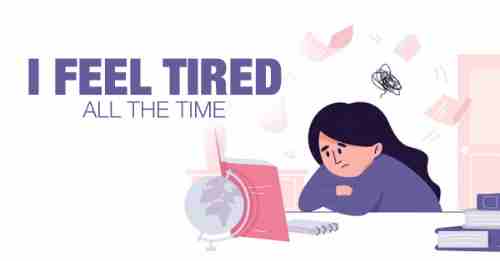Insufficient sleep can be an example of why you could feel exhausted. Other possible causes include stress, nutrient deficiencies, and an underlying health issue or drug-related negative consequences. If you suffer from chronic Fatigue, visit an expert for diagnosis.
If you’re tired to the point of exhaustion or aren’t feeling energetic, If you’re feeling tired, don’t worry.
The cause of Fatigue can be essential factors such as a poor night’s sleep or catching influenza or a cold. But, it could also result from underlying illnesses.
Most cases of Fatigue can be treated with changes in diet or lifestyle to correct a nutritional deficiency and the treatment of an underlying medical issue. Finding the root of the cause is necessary to improve your Fatigue symptoms.
What exactly is Fatigue?
It is a persistent tiredness that lasts long and is a limitation. If you’re fatigued, you’ll experience unanswered, constant Fatigue that is relapsing. This is similar to the way it is when you’ve caught an illness or been unable to sleep for a long time. If you’re suffering from chronic Fatigue or a condition known as systemic exercise intolerance disorder (SEID), You may awake in the morning feeling that you’ve never had enough sleep. You may need help to work effectively or work at home. You may need more time to manage the daily tasks.
Most of the time, there’s some reason behind the Fatigue. This could be due to anemia, allergic rhinitis, depression, fibromyalgia, or depression. It could also be due to chronic liver disease, kidney disease, respiratory disease (COPD), viral or bacterial infection, or another medical condition. If this is the case, the outlook for the future is likely favorable. Below are Fatigue’s most commonly cited causes and the best way to deal with them.
Fatigue and tiredness are the leading causes.
Common reasons for tiredness and Fatigue can be found in the following:
- Sleeping too little or having difficulty getting to sleep (insomnia)
- An unhealthy way of life (such, for example, having a bad diet and a lack of exercise)
- Depression, stress as well as dealing with the challenges of everyday life, including grief and taking care of a baby
- hormonal shifts (such in puberty, menopausal changes, or during pregnancy)
- certain illnesses, such as glandular fever or COVID-19
- Specific medical treatments and medications, including chemotherapy, may cause drowsiness for a duration of time
However, if you cannot articulate why you’re tired and have suffered for a long time without going away, this could indicate a medical issue.
The symptoms you experience could tell you what’s driving your Fatigue or Fatigue. Do not attempt to diagnose yourself – visit a GP If you’re concerned.
Never Feeling Tired Life Factors
The way you live your life may have a significant impact on daytime alertness and levels of energy. The main factors you should discuss with your physician include:
- Diet
- Dehydration
- Habits of sleep
- Stress levels
Diet
The majority of your body’s energy is through food. If you don’t eat a well-balanced meal or skip meals, it could result in poor nutritional intake. It can cause you to feel fatigued throughout the period.
The causes for excessive sleeping can be attributed to:
Mineral and vitamin deficiencies, particularly iron, vitamin B12, as well as vitamin D
The changes in blood sugar levels can hinder your body’s ability to transfer energy into its cells
Excessive alcohol consumption
Too much caffeine consumption
Simple diet and nutritional supplement changes may stop you from feeling tired.
Dehydration
You could become dehydrated if you need more fluids or water in your diet. About 50 to 60 percent of your body weight comprises water. Urinating, sweating, being hot, or getting sick can drain your body’s water.
If you need to drink more fluids regularly on a schedule, you might be more exhausted than usual and low in energy. There needs to be a specific guideline on how much liquids and water you need to drink. Generally speaking, it is to drink eight 8-ounce glasses each day. However, it’s not the case for all people.
The healthcare professional you consult with can guide you on how much liquid you’re supposed to drink and if dehydration might be your reason for being so exhausted.
Poor Sleep Habits
This may sound obvious. It’s not, but you could be exhausted during the day because you sleep too little. These are the most common sleep-deprived sources:
- Try to rest in a room that’s hot, loud, uncomfortable, or noisy
- You’re not following a routine for bed that is designed to assist you in falling asleep
- Exercise within a couple of hours before your bedtime
- Late-night naps
- Inability to receive the right amount of sleep required at the stage you are in
Establishing a routine sleep schedule and setting up an environment that is comfortable to sleep in could assist you in feeling less sleepy during the day.
Stress

While some stresses are expected, prolonged stress can result in Fatigue. Stress over time could lead to exhaustion due to stress disorder (ED), a medical condition that manifests itself in physical and mental indicators of Fatigue.
Additionally, stress can result in functional and structural changes in the brain. This can result in chronic inflammation, which can cause fatigue-related symptoms.
Therapists can also assist with strategies for managing stress. Some health insurance plans offer counseling for mental health and virtual therapy—another option.
Being Tired All The Time: Common Medical Causes

General weakness, Fatigue, and tiredness are signs associated with various illnesses. Sleepiness during the day could be due to the underlying reasons that could include:
Anemia
It’s a disease that causes it to be challenging to circulate oxygen through the body. Commonly, it’s referred to as “iron deficiency” anemia.
Iron is a train car that provides oxygen to your blood of yours. “People who are iron deficient don’t have enough cars to travel on the train they travel on,” Friedman says. “They’re exhausted, they become dizzy whenever they stand or walk around, they have headaches, they have heartbeats.”
The doctor will test the level of anemia by performing a straightforward blood test.
Diabetes
The doctors don’t understand why the people get so tired. The most likely explanation is that your body requires a lot of energy to handle regular fluctuations in blood sugar levels.
The thing that doctors recognize is that tiredness is among the main symptoms of diabetes. The signs are different also. There is a possibility that you feel thirsty and require frequent trips to restrooms.
Troubles with Your Thyroid
It’s a tiny, shapely gland within the neck of your body. The gland produces a hormone that regulates how you utilize energy. If your thyroid gland seems in disarray, it’s not functioning correctly.
“People who suffer from unactive thyroids are likely to be tired,” Friedman says. “Their cells aren’t functioning properly They’re slow and their reactions are slower.”
The doctor might examine the thyroid hormone in your blood to determine if it’s the cause of your Fatigue.
Heart Disease
The feeling of being exhausted often indicates heart failure due to congestion, which happens when your heart fails to perform as well as it could. If you’re suffering from this, you’re tired; it worsens after exercising. There could be an increase in the size of your arms and legs or shortness of breath.
Nutritional deficiencies
Diverse nutritional deficiencies (like Vitamin D, B12 iron, and Vitamin D) could cause cells to be in distress, says William B. Miller, Jr., M.D. expert in infectious diseases, experts, evolutionary biologist, and co-author of Bioverse The Secret of It is that the Cellular World Contains the Secret to the Biggest Question in Life. “The cells in our bodies can sense stress and stress can make you exhausted.” To deal with this problem, Dr. Miller says to first “substantially up your intake of plant-based fibers. Our hunter-gatherer ancestors were fed a large amount of these kinds of nutrition. Our modern diet is sadly deficient in fiber. The good microbes in your body depend on fibers for nutrients. Additionally, it would help if you considered the addition of probiotics. Probiotics are living, supplementary bacteria that can enhance the quantity of beneficial microbes in your digestive tract.”
How often should you see a physician?
While making specific changes to your lifestyle can help reduce exhaustion, it’s not likely to help if you’re suffering from an underlying health issue. In these cases, it’s best to see an experienced medical professional.
Naturally, this must be challenging to spot at a glance. When should you consult a doctor? “If your fatigue persists and is causing disruption to your daily routine, efficiency, or restricting your enjoyment in things, it could be a good idea to talk to your physician,” Dr. Waters states.
The most important thing is the bottom line.
Although everyone experiences moments when they are exhausted and exhausted, being constantly down and exhausted isn’t normal.
Chronic fatigue syndrome has many possible causes, including underlying medical conditions, nutrient deficiency, insomnia, coffee consumption, and ongoing anxiety.
If you’re feeling Fatigue that isn’t explained, You should consult your physician to determine the root of your problem.
Most of the time, you will notice a decrease in Fatigue after you have identified the cause(s) and then make the necessary modifications to your diet and lifestyle or seek the appropriate treatment for your medical condition.